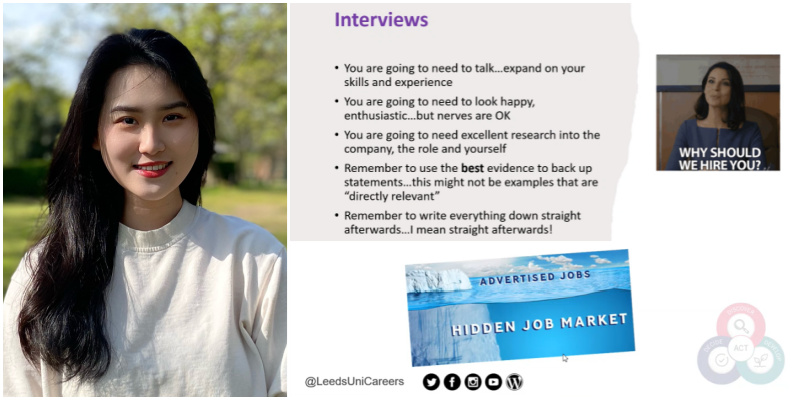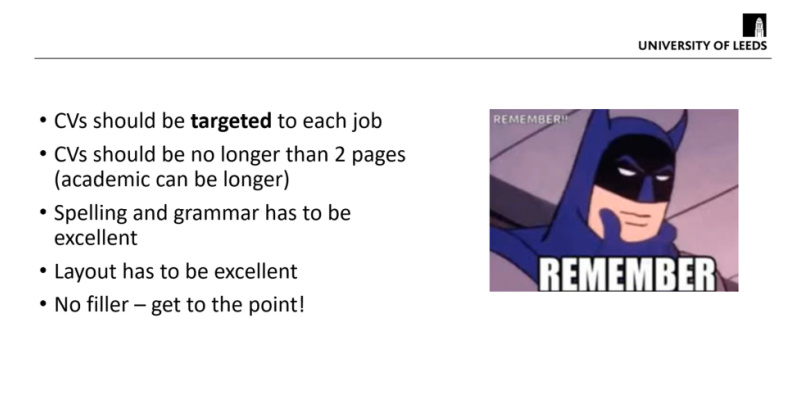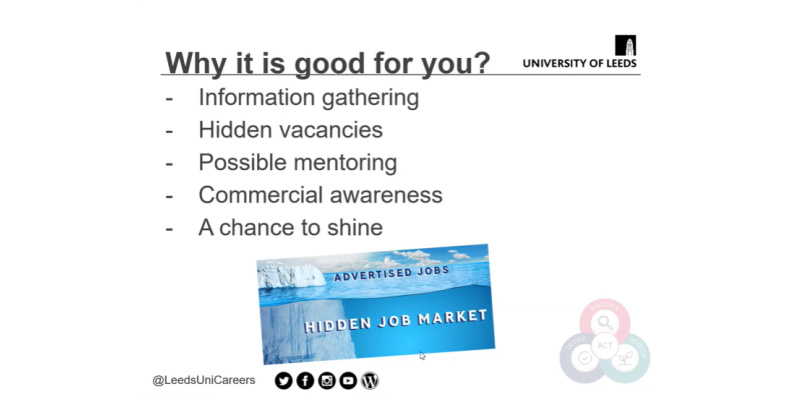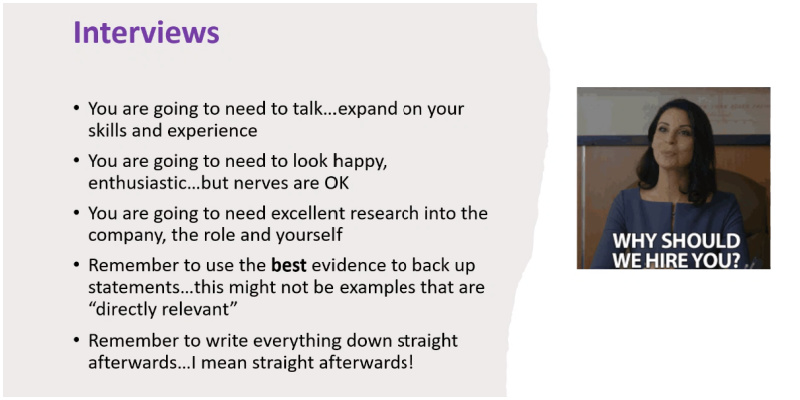Careers Summer Series 2021

Summer holiday, such an exciting word when I heard it after finishing my final exam. But how to make it colourful and memorable is a tricky thing for me. Luckily, the University has already planned rich summer events to join which makes my life easier. Many thanks for that. The careers summer series is one of the activities that I have joined since the vacation began. It is held in the English Language Zone, such an amazing group for international students to improve their English skills. And the speaker of this series is Marc Steward, a really humorous and nice gentleman from the careers centre. Also, Carolin Schneider who assisted Marc in every session and gave a lot of help in defining vocabularies and sending numerous useful web links.
Generally, the series aims to help international students have a better knowledge when they are doing careers activities from writing a UK CV to Preparing for Interviews. For me, as an international student who wants to work in the UK in the future, this series helped me a lot. Following are some notes that I recorded from those webinars:
-
How to write a UK CV
According to the definition of CV “A potted history”, meaning the key purpose of the CV is to show your previous life and things you have done. Further to this, CV is a document of continuous reflection, which means keeping the CV up-to-date and adding new experiences is also significant.

- Target
A good CV should be targeted to each job. Before writing your CV, you should figure out what skills and criteria for the vacancies are needed. The skills you mentioned in your CV should be matched with the role. For example, if you want to apply for a sales role, you may need to point out that you have excellent communication skills and are good at working as a team. Moreover, you need to give evidence to support your skills.
- Format
Normally, a CV should be no longer than 2 pages. Just please remember you are not writing an academic dissertation or a report. Whereas, academic CV can be longer, for instance, if you are a PhD student that you may have done lots of research and programs that you want to mention in your CV.
- Excellent spelling and grammar
If you want to work in the UK, your English is expected to be really good. At this point, you may join the English Language Zone for improving your English skills, or join the Skills@Library workshops to develop your academic writing.
- Excellent layout and no filler
A good layout of a CV tends to reflect that you are rigorous in work, which will give a good first impression to the recruiter. The font size of the main part is usually 11 to 12 and your name at the top can be set in 13 to 14. In addition, all of your experience should follow a chronological order, which means the most recent thing should be written on the top! The whole layout should be succinct and clean. Additionally, like mentioned before, writing a CV is not writing an essay, therefore, you should use bullet points to describe your experiences and evidence the skills that you got.
-
Networking and LinkedIn
Even though we lost a lot of opportunities to communicate with people face-to-face due to the pandemic, there are still plenty of webinars supplying chances to network with people. As a candidate, you may attend a few virtual events which were held by your desired companies. But how to stand out in a crowd? Why is networking important? Following are some tips that I recorded from this session:

- Information gathering
After attending a webinar or any virtual events, make a note of the name of the speaker and the date of the webinar. You can also record the questions that you asked during the event. It will help you personalize your connection with people on LinkedIn.
- Hidden vacancies
Not all of the vacancies are visible to see on the recruitment website, sometimes networking can help you create new career opportunities. For example, looking at News of the company during the pandemic, and see what the profit they made. If a company did well, there may be some speculative vacancies to apply for. You can write a good CV with a cover letter to strive for a speculative job. Showing your inspiration and passion for the company and job. It may give you a chance to start a new career.
- Commercial awareness
Commercial awareness is massively important! It is the ability to view situations from a business perspective, and in particular to be able to understand things from the point of view of a client, customer or a stakeholder. Employers need candidates to understand what is going on in the world. The reason is because of what happens in the world, affects businesses and employers. No matter what course you are studying, you must have commercial awareness. There are 2 things to keep in mind: one is understanding the News and how it affects you, another is understanding yourself and why you are valuable for the company. Again, I should mention the English Language Zone, there is a channel where you can find up-to-date BBC News Word and radio records. It is really helpful to view daily news in a fast and easy way. Moreover, if you want to see a wider range of news, the following News websites are also a good choice:
BBC News: https://www.bbc.co.uk/news
CNN News: https://edition.cnn.com/
Sky News: https://news.sky.com/
Buzzfeed News: https://www.buzzfeednews.com/
The Times: https://www.thetimes.co.uk/
-
Interviews
For me, interviews are the most nerve-racking part of the application process. It contains so many uncertainty factors. I should show my best in that short period, which is really challenging. OK, the reason for an interview is to see if you match the requirements of the job. Also, during an interview, the way you speak and your body language is as significant as the way you show your personality. You have to expand your experiences from your CV and cover letter, otherwise, the interview will be short and it will not go well. Following I will illustrate one of the most common interviews and how we face them.

- Competency-based Interview
Simply, the recruiter will ask you a lot of things that you have done previously. Your working history and experience in the past may show your performance in the future. For example, if the vacancy is related to teamwork. The competency-based question would be “Give me an example of your experiences when you work as a team”.
- How do we face the competency-based interview?
Using the STAR model can make your answer more well-structured. According to the session, the STAR model is divided into four sectors: Situation, Tasks, Action and Result.
In detail, the situation is the background of your previous working experience. You may be talking about what is the aim or the timeline of that job. Keep it succinct and short, just briefly introduce a little bit of the work background.
The task is to describe what you do during your working period. Giving 2 or 3 examples of tasks or programs that you did well.
Action is the crucial part of your answer. In the Task part, you have illustrated some good work that you have done. Therefore, you should use evidence to support your work experience. For instance, “How did you perform that task?” “Why did you do it that way?” or “What did you learn from that experience?” When you consider the task and the action you did, please remember to link those skills to the vacancy.
The result is what happens in the end. Quantify your work and choose some positive results to complete your answer.

Last but not least, I’d like to share some websites for you to do the job research. Firstly, the careers centre can give lots of help including CV checks, job applications and mock interviews. You can also book a one-to-one appointment with careers consultants to talk about your career direction and ask for some advice.
Followed by that, you can find a job within or off campus by using Mycareer and Joblink. Other recruitment websites you may choose are Prospects, Milkround, Targetjob and Student Circus.
